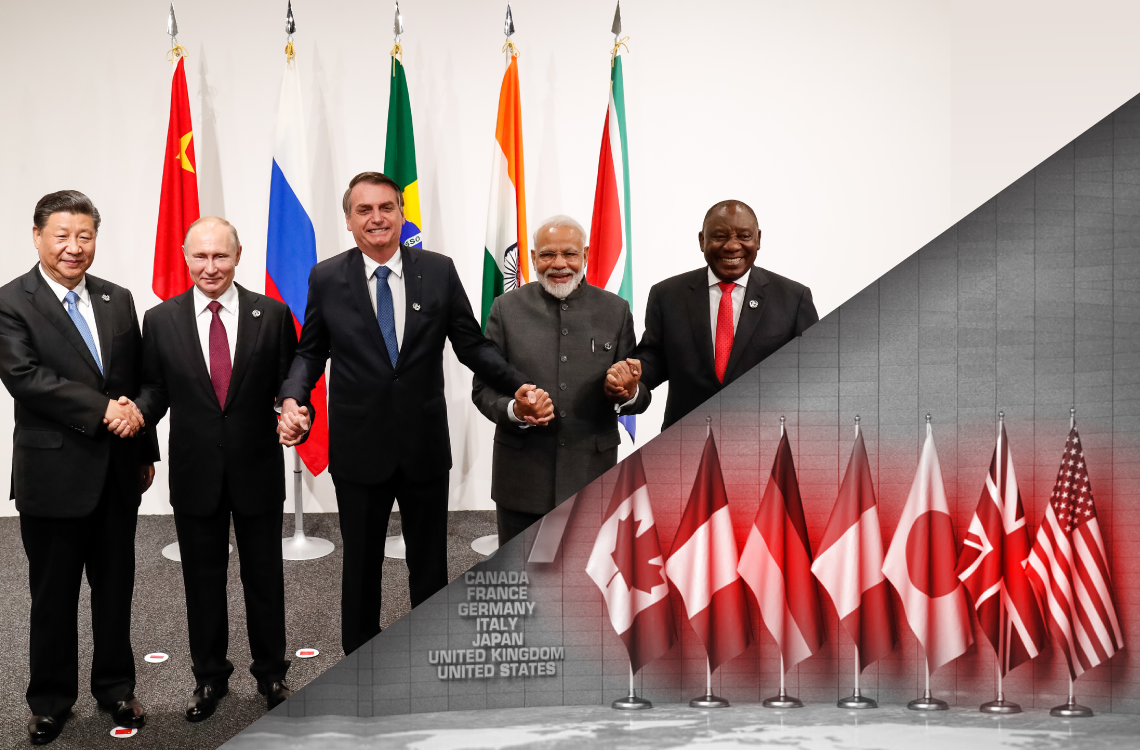A recent Bloomberg report predicts a significant shift in global economic power, as BRICS nations are on track to surpass the G7 countries in economic growth.
By 2028, the collective GDP of the BRICS countries—Brazil, Russia, India, China, and South Africa—is expected to reach nearly 35%, driven by China’s anticipated position as the top source of world growth over the next five years, according to the International Monetary Fund (IMF).
Growth projections: China and India taking the lead
China is projected to contribute 22.6% to global GDP growth through 2028, followed closely by India at 12.9%. In contrast, the United States is expected to contribute only 11.3%.
The report notes that the global economic outlook is currently at its weakest in over three decades due to various macroeconomic developments.
With 75% of global growth expected to be concentrated in just 20 countries, the top four contributors—two of which are BRICS nations (China and India)—will account for half of the growth.
Comparatively, the G7 nations represent a smaller share, with Germany, Japan, and the UK as the top 10 contributors.
A shifting global landscape: The expansion of BRICS and its impact
The BRICS countries currently contribute 31.5% of global GDP, while the G7’s share has decreased to 30%. By 2030, the BRICS nations are expected to account for over 50% of global GDP, with this figure potentially rising further as the bloc expands.
Recent additions to the BRICS New Development Bank, such as Bangladesh, Egypt, and the UAE, demonstrate the growth trajectory of the bloc.
Furthermore, Mexico, long part of the North American free trade bloc NAFTA (now superseded by the Canada-United States-Mexico Agreement (CUSMA)), is poised to join BRICS.
This move could be seen as a direct affront to Mexico’s relationship with the United States and a signal that global economies, even those on America’s border, are questioning the US’s ability to trade on fair and equal terms.
As the BRICS nations gain more influence on the global stage, they are likely to push for reforms within international institutions like the United Nations, World Bank, International Monetary Fund (IMF), World Trade Organization (WTO), and World Health Organization (WHO).
The geopolitical landscape for the remainder of the decade may become increasingly partisan, with the possibility of global divisions emerging unless the West can find ways to accommodate China, Russia, and the new global order that is currently taking shape.
The changing dynamics in global economic power will have lasting implications on international relations, trade, and diplomacy.
As the BRICS nations continue to grow and expand, they will likely challenge the current status quo and seek to reshape global institutions to better reflect their rising influence.
This shift may lead to a more multipolar world, where power is more evenly distributed among the major global players. The BRICS nations’ projected economic growth presents a challenge to the dominance of the G7 countries on the world stage.
As the balance of power continues to shift, it will be crucial for global leaders to adapt and find ways to work together to address pressing issues and foster international cooperation.
The coming years will reveal whether the world can successfully navigate this transition and forge a more inclusive and equitable global economic order.





